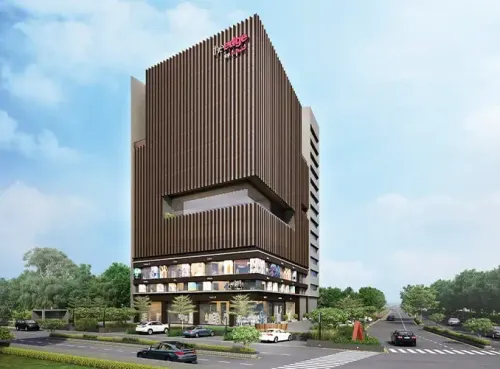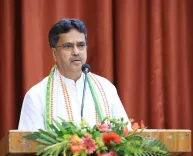Is Gujarat Set to Propel India's Agricultural Revolution?

Synopsis
Key Takeaways
- Gujarat is leading agricultural innovation in India.
- The roadmap focuses on integrating technology for better productivity.
- Farmers are categorized into archetypes for tailored solutions.
- AI and data play crucial roles in enhancing farming practices.
- The vision of Viksit Bharat 2047 is focused on sustainable agricultural growth.
Gandhinagar, Nov 3 (NationPress) Gujarat is strategically positioned to spearhead the transformation of India's agriculture through initiatives like the Digital Crop Survey, Digital Agri Farm Registry, and the i-Khedut portal, as stated by Chief Minister Bhupendra Patel on Monday. This announcement coincided with the unveiling of a groundbreaking road map by NITI Aayog’s Frontier Tech Hub, aimed at reimagining agriculture through advanced technologies.
The road map presents a visionary strategy to leverage frontier technologies, such as climate-resilient seeds, digital twins, precision agriculture, agentic AI, and advanced mechanization, to boost productivity, sustainability, and farmers' incomes across India's varied agricultural landscape.
By categorizing farmers into three main archetypes—Aspiring, Transitioning, and Advanced—the road map provides tailored, actionable solutions that address the unique challenges faced by smallholders and commercial cultivators alike.
“We are creating a cohesive ecosystem that integrates technology at every farming stage. These innovations empower our farmers to combat crop diseases, improve productivity, and utilize next-generation seeds and tools that reduce cultivation costs. Digital integration transcends mere efficiency; it is about empowering our farmers,” Patel emphasized.
“The empowerment of farmers is crucial for realizing the vision of 'Viksit Bharat 2047'. By harnessing AI, data, and precision technologies, we can ensure that every acre is more productive, every drop of water is more valuable, and every farmer enjoys greater prosperity,” shared the chief minister during the event.
The road map underscores that with appropriate interventions, India can achieve unprecedented levels of agricultural resilience, inclusive rural prosperity, and global competitiveness in agri-tech innovation, contributing significantly to the vision of Viksit Bharat by 2047.
“Each farmer in India has unique needs, and technology must reflect that diversity. The true impact of frontier technologies will depend on our ability to customize solutions—whether for smallholders or commercial cultivators, and regardless of whether they grow staples or engage in horticulture,” remarked B.V.R. Subrahmanyam, CEO of NITI Aayog.
According to Debjani Ghosh, Distinguished Fellow at NITI Aayog, “Agriculture is on the verge of a major technological renaissance.”
“For years, progress was gauged by hectares and yields; the upcoming revolution will be measured in data, intelligence, and design. This is the new frontier—where speed, scale, and smart integration will determine success. The challenge is not whether we will transform, but how quickly we can make every farmer a co-creator of this new future,” she concluded.









